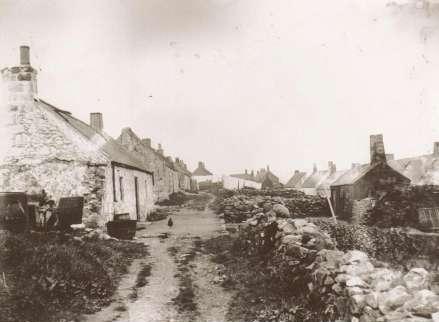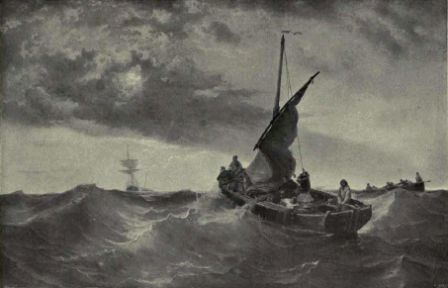
Five Lost (1847) |
I wonder if the villagers felt a sense of déjà vu every time a major storm happened to blow up along the coast. It seemed that around this time, in the middle of the 19th century, there were casualties of one sort or another on a very regular basis – loss of boats, loss of equipment, and in the worst cases, loss of life.
8th April 1847 was one of those days where the people of Portlethen were hit with the worst case scenario. Five people died when their boat was overwhelmed in a gale on this day whilst fishing five miles from the land. In common with previous loss of life at sea, this tragedy involved members of the same family – on this particular boat three brothers by the name of Leiper and two brothers by the name of Craig perished, leaving 5 widows and 27 children.
 Another Portlethen boat, making her way home and heading
for shelter, discovered the sinking boat, with three of the men still in
her. They attempted to render assistance but unfortunately had a hole
driven through their own vessel by a strike from the bow from the
sinking vessel. This caused the rescuers to back off to stop up the leak
using their “coats and caps”. By the time they were ready to make
another pass the distressed vessel had sunk and there was no sign of any
of their crew, therefore they made their way back to shore where they
had to break the sad news of the loss to the local community.
Another Portlethen boat, making her way home and heading
for shelter, discovered the sinking boat, with three of the men still in
her. They attempted to render assistance but unfortunately had a hole
driven through their own vessel by a strike from the bow from the
sinking vessel. This caused the rescuers to back off to stop up the leak
using their “coats and caps”. By the time they were ready to make
another pass the distressed vessel had sunk and there was no sign of any
of their crew, therefore they made their way back to shore where they
had to break the sad news of the loss to the local community.
The Aberdeen Journal noted, “The melancholy event has cast a deep gloom over the village and neighbourhood, the men being all much respected. They were also most regular attendants on public worship; and, we understand, the respected minister of Portlethen took occasion, on Sabbath last, to improve the melancholy event to his hearers, when he delivered a most impressive discourse to a numerous and much affected congregation. There was scarcely a dry eye in the whole congregation.”